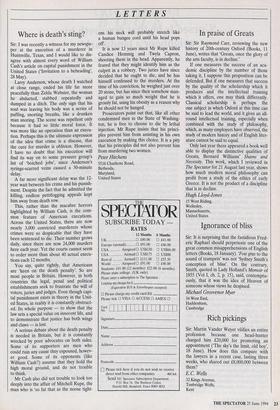LETTERS Where is death's sting?
Sir: I was recently a witness for my newspa- per at the execution of a murderer in Huntsville, Texas, and I would like to dis- agree with almost every word of William Cash's article on capital punishment in the United States (`Invitation to a beheading', 28 May). Larry Anderson, whose death I watched at close range, ended his life far more peacefully than Zelda Webster, the woman he abducted, stabbed repeatedly and dumped in a ditch. The only sign that his soul was leaving his body was a series of puffing, snorting breaths, like a drunken man snoring. The scene was repellent only because it had so little moral force. It was more like an operation than an execu- tion. Perhaps this is the ultimate expression of the idea that crime is a disease, that the cure for murder is oblivion. However, I have no doubt that his execution will find its way on to some pressure group's list of 'botched jobs', since Anderson's syringe-scarred veins caused a 30-minute delay. A far more significant delay was the 12- year wait between his crime and his punish- ment. Despite the fact that he admitted the killing, endless pettifogging appeals kept him away from death row. This, rather than the macabre horrors highlighted by William Cash, is the com- mon feature of American executions. Across the United States, there are now nearly 3,000 convicted murderers whose crimes were so despicable that they have been sentenced to die. Their number grows daily, since there are now 24,000 murders here each year. Yet the courts cannot seem to order more than about 40 actual execu- tions each 12 months.
You say, quite rightly, that Americans are 'keen on the death penalty'. So are most people in Britain. However, in both countries the legal, penal and political establishments seek to frustrate the will of voters, juries and judges. Even though capi- tal punishment exists in theory in the Unit- ed States, in reality it is constantly obstruct- ed. Its whole purpose — to show that the law sets a special value on innocent life, and to demonstrate that justice has both wings and claws — is lost.
A serious debate about the death penalty is needed in Britain, but it is constantly wrecked by poor advocates on both sides. Some of its supporters are men who could ruin any cause they espoused, howev- er good. Some of its opponents (like William Cash?) assume that they hold the high moral ground, and do not trouble to think.
Mr Cash also did not trouble to look too deeply into the affair of Mitchell Rupe, the man who is 'so fat that as the noose tight- ens his neck will probably stretch like a human bungee cord until his head pops off.
It is now 13 years since Mr Rupe killed Candice Hemmig and Twyla Capron, shooting them in the head. Apparently, he feared that they might identify him as the culprit in a robbery. Two juries have since decided that he ought to die, and he has himself confessed to the murders. At the time of his conviction, he weighed just over 20 stone, but has since then somehow man- aged to gain so much weight that he is grossly fat, using his obesity as a reason why he should not be hanged.
Prosecutors point out that, like all other condemned men in the State of Washing- ton, he is free to choose to die by lethal injection. Mr Rupe insists that his princi- ples prevent him from assisting in his own execution by making this choice. It is a pity that his principles did not also prevent him from murdering two women.
Peter Hitchens
5516 Charlcote Road, Bethesda, Maryland, United States
































































 Previous page
Previous page